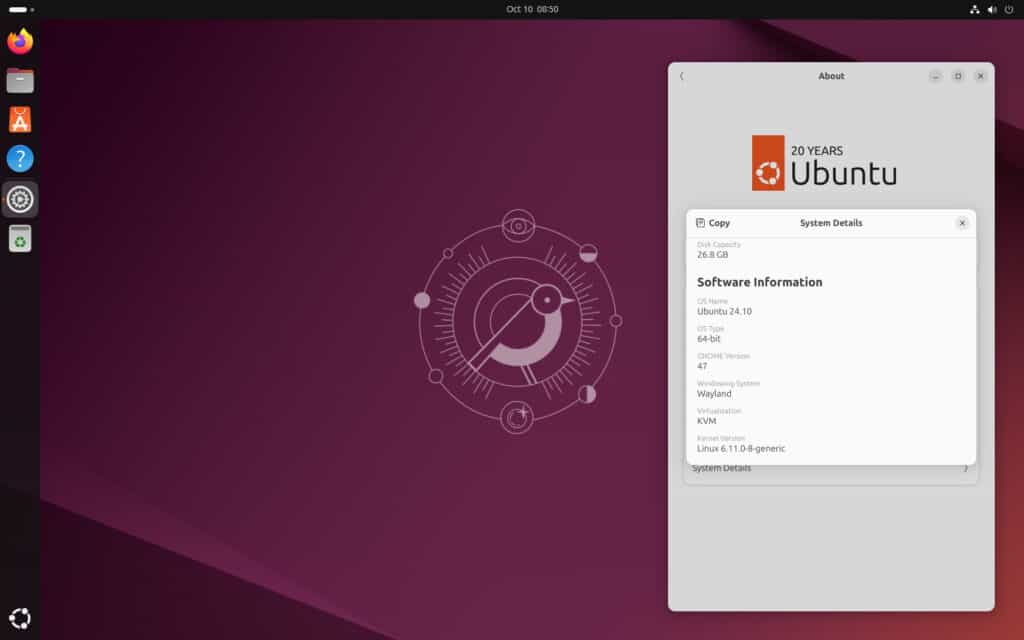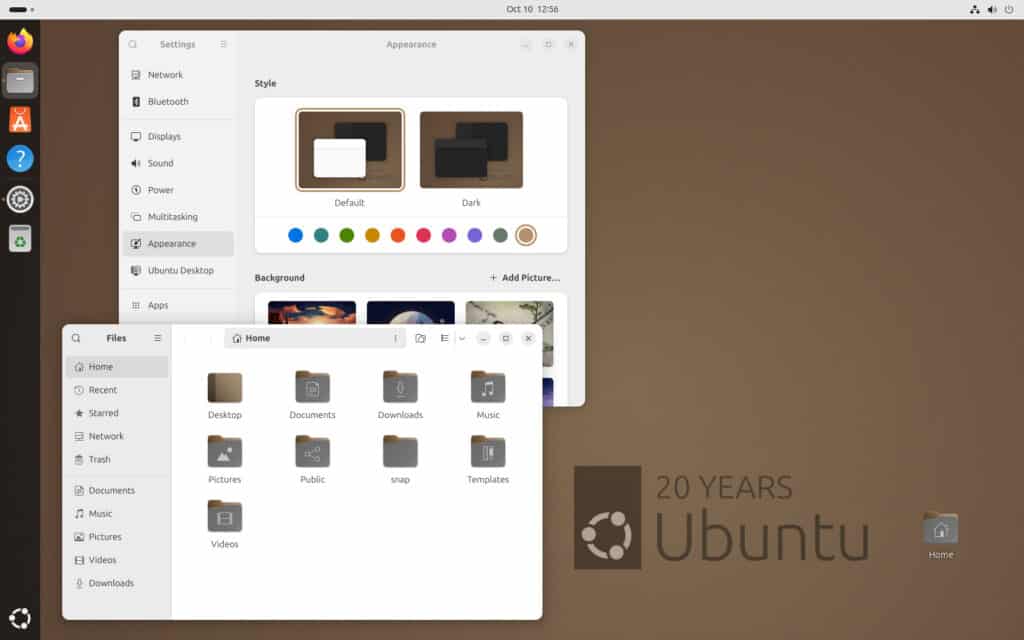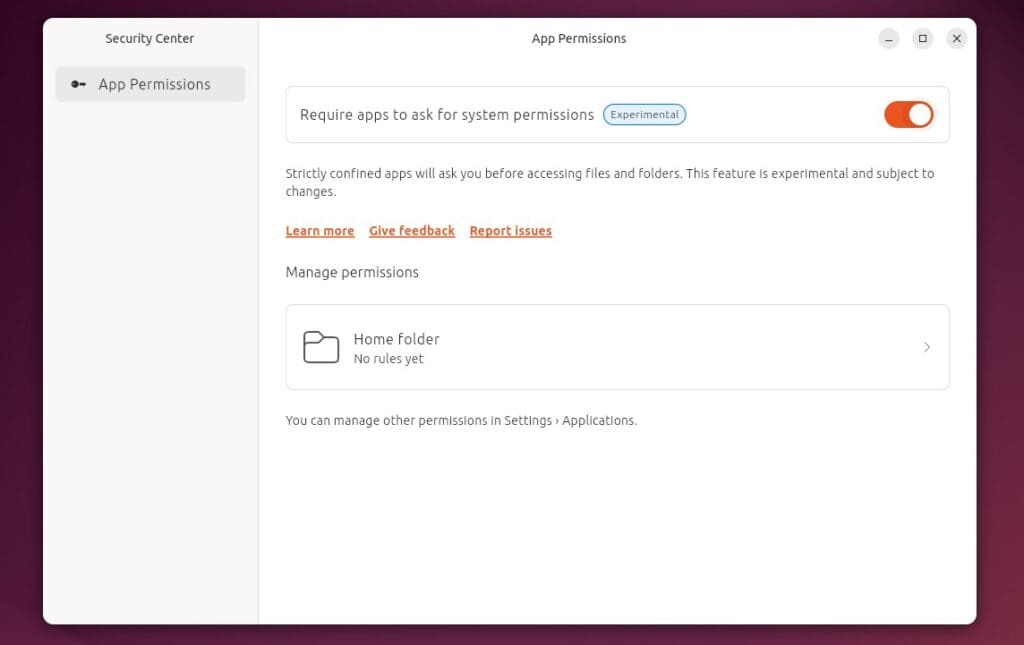Today, Canonical announced the release of Ubuntu 24.10, codenamed “Oracular Oriole,” which delivers important updates, new features, and improved performance.
In addition, this release is a bit more special than the other short-term ones for one simple reason—it marks Ubuntu’s 20th anniversary, celebrating two decades of innovation that changed the Linux desktop ecosystem forever. So, here’s what’s new.
Ubuntu 24.10 Highlights

New Features
As the first release under Canonical’s new policy of using the latest Linux kernels in Ubuntu, Oracular Oriole comes with kernel version 6.11, bringing modern hardware support and performance upgrades.
OpenSSL has also been upgraded to version 3.3, bringing better scalability, and systemd has jumped to version v256.5, deprecating support for older cgroup v1 and System V service scripts—marking a move toward modernization.
In terms of networking, Netplan has been updated to version 1.1, adding custom wait-online logic and improvements to SR-IOV devices.
Developers also have plenty to look forward to, with the toolchain receiving major updates:
- GCC is now at version 14.2.
- Python has been updated to 3.12.7.
- Rust has moved up to version 1.80.
Meanwhile, OpenJDK 23 and even an early preview of OpenJDK 24 are now available for those looking to push the limits of Java.
Enhanced Desktop Experience
Of course, the Ubuntu 24.10 desktop has also received various usability improvements. The installer now supports local file paths for auto-installation, and the Power Profiles Manager has been upgraded to enhance battery-aware optimizations—particularly beneficial for AMD users. Fingerprint support is also extended with updates to fprintd and libfprint.
GNOME fans will appreciate the update to GNOME 47, along with stability and performance enhancements unique to Ubuntu. The iconic Dock has also been upgraded to visualize snap refreshes and improve handling for Progressive Web Apps installed via Chromium.
The App Center has received new features, such as improved messaging for running snaps, direct uninstallation options, and third-party “.deb” installation support, further simplifying software management.
Celebrating 20 Years of Ubuntu
In a nod to its heritage, Ubuntu 24.10 celebrates the 20th anniversary of the first Ubuntu release, 4.10 “Warty Warthog.” In light of this, users will notice several throwbacks, including the return of the original startup sound and a “Warty” brown accent color—available as a style setting.

There’s also a special anniversary logo to honor the community that has supported Ubuntu over the years.
Security and Performance Enhancements
Ubuntu 24.10 debuts a new Security Center, giving users easy control over experimental permissions prompting. Performance improvements have also been made, including introducing Sysprof 6 as a default system utility to help identify app performance issues.

Additionally, the Oracular Oriole release makes Wayland the default display server for systems using NVIDIA graphics, though users can opt for Xorg during login if needed.
Upgraded Applications
The core applications like Firefox, LibreOffice, and Thunderbird have all been updated, offering new features and enhancements. The audio and networking subsystems have also seen updates, with PipeWire 1.2.4, NetworkManager 1.48, and BlueZ 5.77 all getting the (almost) latest versions for a better multimedia and connectivity experience.
Ubuntu 24.10 (Oracular Oriole) Spins
Now, let’s say a few words about the most important changes in each of the official Ubuntu spins.
Edubuntu 24.10
An educational-purposed Edubuntu 24.10 introduces GNOME 47, a new default wallpaper for this and the next two releases, to distinguish these versions for the 24.04 LTS cycle until the next one. It also features Permissions Prompting and the Security Center, aligning with Ubuntu Desktop’s updates.
Kubuntu 24.10
KDE Plasma-centered Kubuntu 24.10 ships with the new KDE Plasma 6.1 and includes updates to core packages such as KDE Frameworks 5.116 and 6.6.0, as well as numerous updated KDE gear applications. Wayland is now the default Plasma session, though users can switch to X11 if preferred.
Lubuntu 24.10
LXQt-focused Lubuntu 24.10 introduces a transition to a primarily Qt 6-based environment, enhancing theming compatibility with modern while retaining Qt 5 support for older applications.
It also replaces the Breeze theme with Kvantum theming, designed to avoid incompatibilities with LXQt. Though Wayland was planned, it has been postponed to Lubuntu 25.04. A new wallpaper and login screen round out the visual updates.
Ubuntu Budgie 24.10
Ubuntu Budgie 24.10’s highlight is a major shift toward a Wayland-based system, alongside improvements to the Budgie Desktop, including bug fixes for session dialogs, notifications, and system tray icons.
Key applet enhancements include updates to the budgie-sysmonitor-applet and extended support for Apple’s .heif and JPEG-XL image formats. The default terminal has been switched to xfce4-terminal due to the lack of maintenance for Tilix.
Ubuntu MATE 24.10
The lightweight Ubuntu MATE 24.10 brings stability with the MATE Desktop 1.26.2, offering bug fixes and improvements since version 24.04. Key changes include the return to the Slick Greeter for login screen configuration and a reduced ISO size of 3.3GB, down from 4.1GB.
Although MATE Desktop 1.28 was prepared, it was not included due to unresolved bugs.
Ubuntu Studio 24.10
Targeting creative individuals in the areas of audio & video production and graphics design, Ubuntu Studio 24.10 introduces significant updates, including the switch to KDE Plasma 6.1 and a shift from the linux-lowlatency kernel to linux-generic with low latency boot options.
The release also deprecates PulseAudio/JACK in favor of PipeWire, though JACK remains usable with adjustments. The ISO image now offers a Minimal Install option, and the default theme has changed from Materia to Orchis. Key software upgrades include PipeWire 1.2.4, Audacity 3.6.1, Ardour 8.6, digiKam 8.4, GIMP 2.10.38, Blender 4.2.1, and OBS Studio 30.2.3.
Ubuntu Unity 24.10
Ubuntu Unity 24.10 continues using the Unity 7.7 desktop environment while introducing a new Lomiri variant, developed in collaboration with the UBports Foundation, as a potential alternative to Unity7.
The release also includes a switch to the Calamares installer, offering a smoother installation process. While Unity7 remains in use, Lomiri is positioned as a future-proof alternative in case of further system changes.
Xubuntu 24.10
Xfce-focused Xubuntu 24.10 includes pre-release software, notably Xfce 4.19 (a development preview of the upcoming Xfce 4.20), so users may encounter more bugs than usual. Major updates feature enhancements in icon scaling, Wayland support, and power management, along with introducing some Xfce 4.19 components in anticipation of Xfce 4.20.
Noteworthy issues include installer bugs, virtual machine performance problems, and multiple notifications from the Xfce PulseAudio Plugin. Users requiring a more stable environment are encouraged to install Xubuntu 24.04 LTS.
Ubuntu Cinnamon 24.10
Ubuntu Cinnamon 24.10 maintains the same versions of Cinnamon as the 24.04 (Noble Numbat) release, with a few updates from Cinnamon 6.2. Notable changes include crash fixes in the Cinnamon Control Center and the use of mozjs115 in CJS 6.2.0, while other components, such as Nemo and the screensaver, remain unchanged.
The Yaru-Cinnamon theme tradition continues, and the release retains the Ubuntu Desktop Installer for the live image.
Download Ubuntu 24.10
If you are eager to try out all the Oracular Oriole’s new features, the installation ISO image is available for download here. Additionally, the release notes provide a detailed overview of all updates in the new release.
Moreover, the installation ISO images for the 24.10 version of all Ubuntu official spins are also available and can be downloaded from the following links: Edubuntu, Kubuntu, Lubuntu, Ubuntu MATE, Ubuntu Budgie, Ubuntu Unity, Ubuntu Studio, Ubuntu Cinnamon, Ubuntu Kylin, and Xubuntu.
Ubuntu 24.10 will be supported for nine months, until July 2025, providing users with a short-term yet solid update path. Ubuntu 24.04.1 LTS remains the better choice for those needing long-term support, with support extended until at least 2029.

My laptop had some hardware problems so opted to buy a new Asus Vivobook with an oled screen i7 ultra processor which includes the new ARC integrated graphics. Seeing that Ubuntu is shows the most collaboration with intel on this I installed Kubuntu 24.10 whose GUI installer worked flawless and simple. After updating I found the intel instructions for using their latest driver at this link >https://dgpu-docs.intel.com/driver/client/overview.html . This enabled me to add their repo to my sources and install the driver and related libs. I am very pleased with the result of the latest driver. I don't game but I do video and the ARC works extremely well for that. Great shading, perfect saturation and color balance. Enough horsepower to work quick, not stutter and have a seamless result. Kudos to Ubuntu for advancing this tech with intel. Two quarks. The laptop has an led backlit keyboard, the arc driver & etc. does not have a tool to control that. It is what it is. However after I update and make sure all is well with a reboot. I then shut it down, when I turn it on the first UEFI shows the ASUS logo I focus looking when it disappears. Disappears, I then count one thousand, two thousand and immediately at two thousands press the escape key 3 times. Now Kubuntu will boot and led is locked on max brightness and white in color. This eliminates the pluse of diming and the slow change or one to another color. The second quark will no doubt resolve itself with time. The version of kio-admin Kubuntu uses is not compatible with some module of plasma so it does not function. This impacts giving Dolphin root access. I have no problem with that but some might. Other than that Kubuntu 24.10 is a polished well done OS that serve your needs reliably. I highly recommend it.
looks interesting but i will staying on lts version but i do like seeing what they are doing. i think when next lts version comes out i might wait a extra year before upgrading to make sure all the bugs are found.